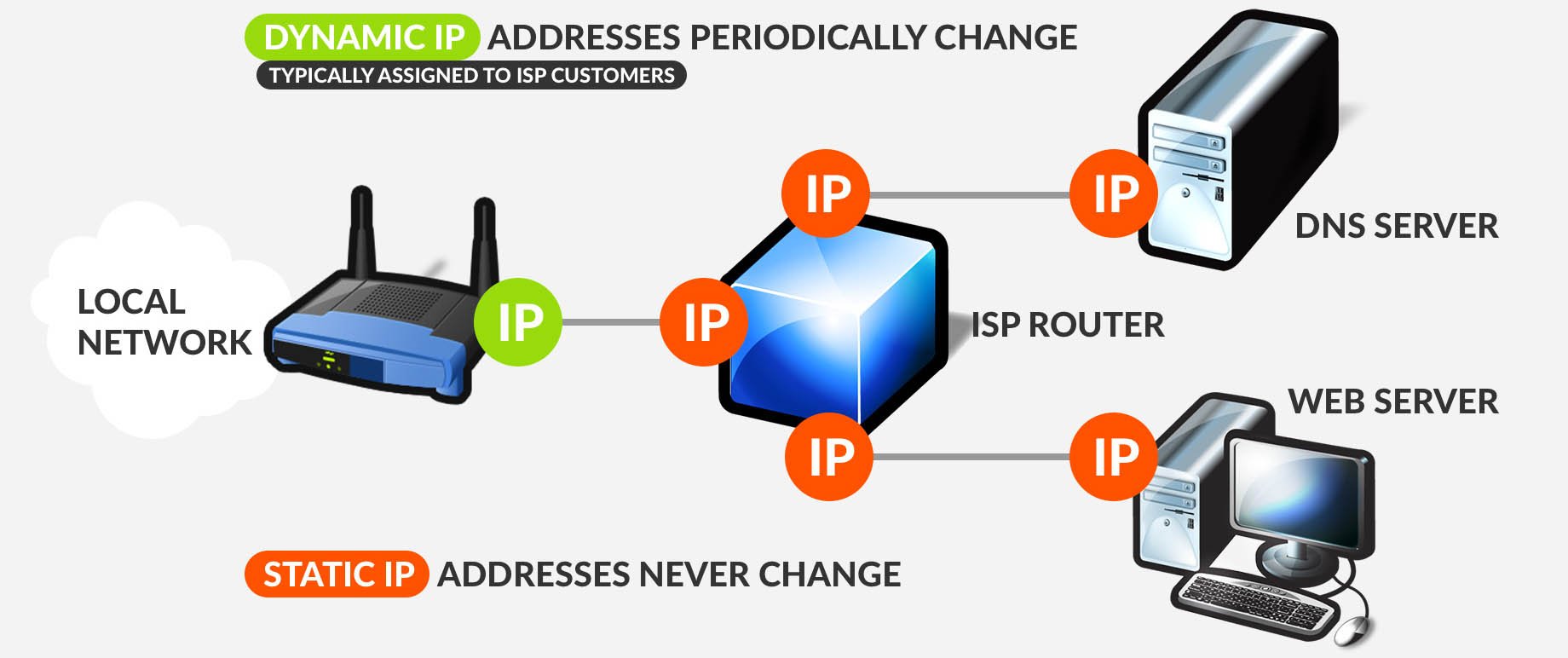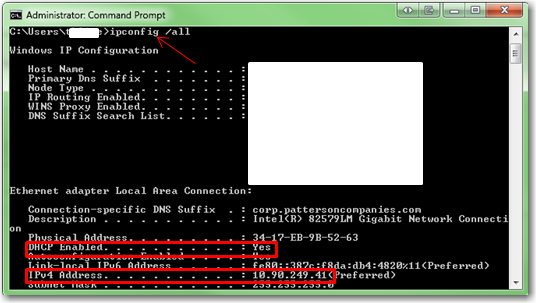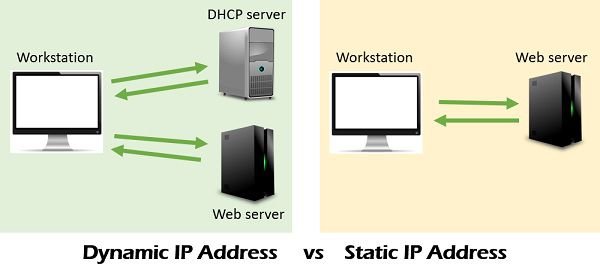FTC disclaimer: This post contains affiliate links and I will be compensated if you make a purchase after clicking on my link.
When you want to communicate in a network or internet, you need an IP address—the IP address act as a medium to interlinked your home network and the internet.
Whenever you subscribe to internet service, you will be allocated with either a static or dynamic IP address.
In any home networking, the computer is assigned with a dynamic IP address by the ISPs (Internet Service Providers).
The common reason for assigning a dynamic IP address is because it is cost-effective and more secure.
The static IP address is only assigned to an individual computer only upon request bearing an extra cost.
Later in the article, we will look after the differences between static and dynamic IP addresses and their benefits.
Before that, let’s learn what an IP address is.
What is an IP address?
An IP address is a unique number assigned to a device (computer or server or mobile device) to interact in a network that uses the TCP/IP model.
The IP address is very similar to a home address, which is easy to identify the location and set up a communication with other devices in the network.
You will mainly observe that the IP address is stored as a number. Also, the IP address comes in two versions: IPv4 and IPv6.
The IPv4 address, which we generally observe, is assigned to a computer in a network.
The IPv4 address is consists of a 32-bit number separated by a dotted-decimal notation.
In other words, it is divided into a four-part decimal number, where each part consists of 8-bit separated by periods (.).
For instance, 168.172.39.01 is an IPv4 address.
In contrast to IPv4, the IPv6 address consist of alphanumeric number separated by hexadecimal notation.
In other words, the IPv6 address consists of an 8 part hexadecimal number, where each part consists of 4-bit separated by a colon (:).
For instance, 2001:cd89:0000:0000:0ad7:0000:008a:02f0 is an IPv6 address.
So, we generally see an IPv4 address assigned to a device when connected to a network.
And you can click here for complete information on bits and bytes.
What is a Domain Name System (DNS)?
As we know, the IP address is configured with each device (computer or server) in a network. But it isn’t easy to communicate with an IP address when dealing with a large network.
To remember and interact with other network devices, humans prefer names, and machines prefer numbers.
The name given to an IP address is known as a domain name, easily recognizable in a network.
For instance, digitalmediaglobe.com is the domain name for an IP address of 104.28.31.97.
When you type a domain name in a browser, it will first convert a domain name to an IP address. The system that uses to resolve an IP address is known as the DNS system.
You can look for a guide to find the complete detail of the Domain Name System.
What is a static IP address?
The static IP address is those IP address which does not change with time. It means that once it is assigned to a device, it remains the same until the device administrator wants to change.
The static IP address is mostly popular in servers and some important equipment.
So, when you host a website, the server administrator will assign you a static IP address recognized and identified on the internet.
The static IP address is basically provided by Internet Service Providers (ISPs).
A question can arise whether an individual can have a static IP address.
It depends on the nature of the work, and it will add up to your cost. Let suppose you are providing an email service; then, you will require a static IP address.
Moreover, the static IP address can be IPv4 or IPv6. Although most of the devices in a network are using IPv4 addresses, in the future, it will get converted into IPv6 addresses.
Additionally, to recognize a device or server in a network, we assign a domain name to an IP address, further assigned by IANA (Internet Assigned Number Authority), an ICANN subsidiary (Internet Corporation for Assigned Names and Numbers).
What is a dynamic IP address?
The dynamic IP addresses are those IP addresses which is subject to change with time.
It is assigned using a DHCP protocol (Dynamic Host Configuration Protocol), which is completely automatic and doesn’t require manual intervention.
On the Internet, the home or office devices are basically configured with a dynamic IP address. Your ISP’s DHCP server assigns it.
So, in a home or office network, multiple devices (computers, laptops, mobile phones, tablets) are connected by your network router. The network router work establishes a connection between your device and ISP (Internet Service Provider).
Before establishing any connection, the network router will assign your device with a dynamic IP address, which is basically provided by your ISP’s DHCP server.
Static vs. Dynamic IP address Differences
As we have stated, what static and dynamic IP address mean. Let look into static and dynamic IP address differences and which one is best suited for us.
Mostly, choosing a static or dynamic IP address depends on the nature of the connection.
Grossly, the static IP address is preferred and relevant for business purposes, whereas the dynamic IP address is best suited for the home network.
Advantages of a Static IP address
There are multiple advantages to a static IP address. Some of the benefits include:
Managed by DNS server
The DNS server’s static IP address is easily managed when it is assigned with a corresponding domain name.
Use to setup Server Hosting.
You can use a static IP address to host your web server, email server, or any server. As a result, the static IP address is easy to locate and recognized by your clients.
DNS server will store your server records, known as DNS records, and provide to user client (such as a browser) whenever requested.
Suitable for VPN
The static IP address is used by VPN (Virtual Private Network) or any other remote access program to work remotely from anywhere.
Let suppose you are in New York City and want to work from London, then you require a static IP address of London, and the tool required is VPN. For a VPN service, you can look for NordVPN.
Setup Reliable Communication
To set up reliable communication, you need a static IP address. It is mostly used services like Voice over Internet Protocol (VoIP) and other voice or video communications.
Disadvantages of a Static IP address
The static IP address has some disadvantages which should be taken into account.
More prone to hacking or other security concerns
The static IP address is easy to locate and target. It will be easily visible to hackers or government agencies who can snoop on your daily activity and target accordingly.
To hide your static IP address from prying eyes, you can use a VPN like NordVPN or ExpressVPN.
Have to pay a higher cost
The static IP address will cost you more, or we can say that it will add-up additional cost to your plan.
For this, it depends upon the nature of work and how long you would like to hold a static IP address.
The ISP generally has a separate plan for business purposes.
Advantages of a dynamic IP address
For home or business network, the dynamic IP address has several advantages.
Easy to configure
The dynamic IP addresses are easily configured and allocated to an individual device using the DHCP server. So, no manual intervention is needed.
Provide better security
The dynamic IP address provides better security because it keeps changing automatically after a certain interval of time. So, it is tough to snoop for snoopers.
Also, it isn’t easy to target your network devices or home network.
But, the exact location can be identified by hackers or government agencies. For better protection, you use VPN (NordVPN or ExpressVPN).
Less costly
The dynamic IP address doesn’t cost you any extra because it comes with your service plan and includes the fee, which is nominal.
Disadvantages of a dynamic IP address
A dynamic IP address is not suitable for all situations, and it doesn’t support most of the services.
Let’s look into some of the disadvantages.
Unable to host as a server
The dynamic IP address is not suited to host a server because it keeps changing with a certain time interval. It will create more problems and complexity to a network.
Doesn’t fit for remote access
The dynamic IP address doesn’t support remote access for most of the software programs. It will create trouble while connecting with other devices or remote software.
Although some services are exceptional, like a VPN service.
Conclusion
The differences between static and dynamic IP address clearly states which IP address is suitable for you.
If you are not aware, what is your IP address then you can easily find your IP address as stated in this tutorial.
To protect both your static and dynamic IP addresses, you require a good VPN service that will help you to hide your IP address from snoopers.














